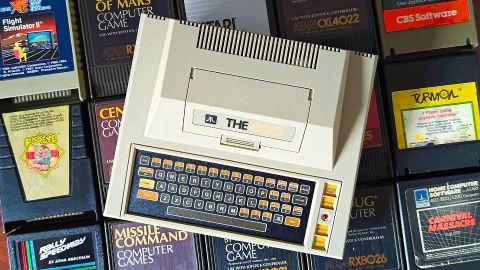GamesRadar+ Verdict
The Atari 400 Mini serves up cute, convenient access to the microcomputer's best capers, making for an adorable homage to a historic system. The mini plug and play console itself is going to look fantastic sitting on your shelf or desk, and while it could have gone further in terms of interactive design, attention to detail and accurate software emulation make for a tremendous trip through videogame history.
Pros
- +
Adorable, authentic design
- +
25 built-in games
- +
Save and rewind functions
- +
USB controller compatibility
Cons
- -
Pricey
- -
Lacks interactive design features
Why you can trust GamesRadar+
In many ways, microcomputers like the Atari 400 are my Roman empire. The THE400 Mini has made that fact even clearer to me, as the experience of flicking through my personal collection of old microcomputer games and trying them out on the plug and play homage became a hyper fixation during testing. I can’t say any other mini console has managed to steal several hours of my time at once quite like this one, and that in itself is a testament to its capabilities.
Coming in at $119.99 / £99.99, there’s no getting round the fact that the THE400 is an expensive mini retro console. For that reason, I was expecting quite a lot from PLAION and Retro Games Ltd’s collab, especially since better known systems have released in the past with a lower MSRP. Thankfully, this latest recreation strikes a balance between style and substance that will be universally appreciated, whether you’re a vintage gamer or someone who casually appreciates old classics.
Arguably, systems like the THE400 are helping to keep the mini console scene alive. It feels like only yesterday the NES Classic Edition sparked a plug and play craze, with a craving for tiny systems starting to fizzle out as the 2010s came to a close. Unlike those popular platforms, getting hold of an original Atari 400 is pretty pricey, so you could argue gamers will benefit more from this microcomputer than something like the Dreamcast 2. Am I going to regret saying that? Maybe, but as someone who has most old consoles to hand, Sega’s ‘90s hardware is a lot easier to deal with in 2024 than the ageing ‘70s microcomputer.
Specs
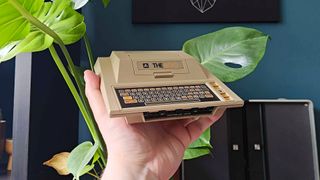
Before we dive into how freaking adorable the THE400 is, let’s run over its specs. Since we’re talking about a plug and play designed to emulate 8-bit computer games from over 40 years ago, it makes sense that it’d opt for a ARM Cortex-A7 processor, 256MB RAM, and 128MB flash memory. Keeping the hardware featherlight means you can power the console using 5V 1A via USB-C, all while still enjoying 720p visuals and plenty of USB ports.
In terms of IO, you’ll have HDMI out and five USB-A ports at your disposal, four of which live up front as “controller jacks”. Unlike the Atari 2600+ that landed in November 2023, THE400 doesn’t feature a cartridge slot or any means to directly run your physical collection, which perhaps makes sense given that it’s smaller than some old cart boxes. Am I slightly disappointed that I can’t whack some of my obscure favorites into the top of this mini PC? Slightly, but we’ll get onto why there’s enough going on software wise to make up for it soon.
In the box, you’ll also get a replica of the OG joystick dubbed the THECXSTICK, and it’s not just a USB version of the controller bundled with the Atari 2600+. Instead, it wields some extra buttons that make navigating the OS possible, like a home option and quick access to the settings menu. It’s fine, especially if you’re looking for a completely authentic experience, but I’d be lying if I said I didn’t immediately reach for an alternative controller. FIY, most options will play ball, providing you’ve got enough buttons on the pad to suit relevant games and parts of the software.
Design




At this stage, I pretty much expect every mini console to look like the hardware it's based on. So, it’s not entirely shocking that the THE400 resembles a shrunken Atari 400 computer, but I’m still impressed with the detailing included with the model. The keyboard, while purely for aesthetic purposes, features the same sort of texture as the membrane pad on the original system, and it’s even got the same side function buttons with a red LED sandwiched in between.
For convenience, the power button and jack have been moved to the back. Doing so makes practical sense from both a design and usage standpoint, but I would have been impressed if the original layout was retained. That aside, every ridge and vent is exactly where it should be on the mini’s beige body, including that shuttle-style cartridge door that rounds off the ‘70s futurism vibes. The catch? The hatch is just for show, and that’s the part I’m really upset about.
I could live with the keyboard not being functional, as that’s been the story since the C64 Mini. However, I feel like I’ve been spoiled in terms of interactive design traits by the likes of the Sega Genesis Mini and PC Engine Mini, both of which feature tiny novelties like cartridge flips, removable doors for expansion ports, and even lock mechanisms that would have held Hu Cards on the original PC Engine in place.
I’m not in the business of designing tiny retro consoles, but if I was the big cheese in charge of this project, I’d have used the cartridge door to hide a USB port. Being able to flip the lid up and physically plugging something in (a USB stick rather than a cart in this case) would have perfected the experience in terms of physical authenticity. I’d have even settled for a little easter egg of some kind within the bay, but alas, it’s simply a pretty plastic mold.
Features
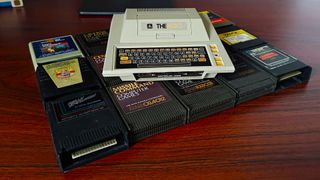
Retro Games Ltd knows how to pack features into a mini system, and the THE400 doesn’t skimp on software perks. Having 25 games baked in is already a massive boon, but the operating system providing access pulls off being functional and fun. Jaunty chiptune music accompanies a carousel style menu-system that makes diving into each included outing easy, with artwork adding that extra level of nostalgic pizazz.
I’m a big fan of the presentation here, particularly when it comes to the synopsis blurb included with every built-in adventure. That said, this console is compatible with more than just the Atari 400, and for whatever reason, the menu doesn’t tell you which console each game belongs to. For example, I managed to confuse myself when playing Berzerk, as I almost thought there was a microcomputer release I hadn’t played. It turns out that it’s actually the Atari 5200 version, but there’s no way of telling from the menu screen.
Small labelling omissions aside, there are a bunch of handy options in the settings menu that are worth using. For instance, if you love the look of old CRT TVs, you’ll be able to toggle scanlines, and you can even choose between a 4:3 aspect ratio or a ‘pixel perfect’ mode that remedies artefacts. Those tweaks are accompanied by a bunch of fun borders that will mask off the vertical letterboxing, just in case you can deal with your entire display not being filled.
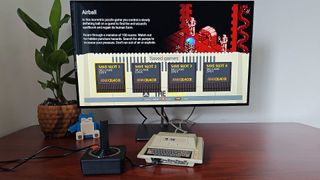
As for in-game tricks, there’s a save system and a 30 second rewind mode, so you’ll have some modern comforts to help overcome those ‘80s arcade levels of difficulty. However, arguably the biggest game-related feature is the ability to run your own ROMs using a USB stick, something that’s normally omitted from mini consoles. As I already touched on, this lil PC runs more than just Atari 400 romps, boasting support for XL and XE series as well as the Atari 5200, meaning you’ll have a massive selection of games to try out (providing you’ve got your own digital backups).
While it’s a bit niche, it’s also possible to load up BASIC using the THE400. I’d say this is an essential feature, as it’ll help place you in the shoes of someone trying to program back in the ‘80s. I’ve always wanted to give using the old OS a proper whirl, and while I do think old keys are charming, I’d much rather use a modern gaming keyboard at my desk to rattle out lines of code.
Games
I’m going to avoid getting into an argument about the best Atari games, but there’s a respectable collection included with the THE400. Classics like Berzerk, Boulder Dash, Lee, Miner 2049er, and Centipede are all present, and there’s a few I’d personally never heard of (Flip and Flop won me over instantly by featuring a kangaroo called Flip and a Monkey called Mitch).
THE400 built-in game list:
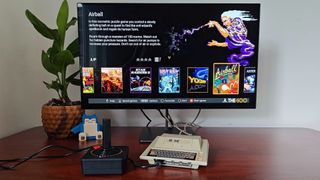
- Airball
- Asteroids
- Basketball
- Battlezone
- Berzerk
- Boulder Dash
- Bristles
- Capture the Flag
- Centipede
- Crystal Castles
- Elektraglide
- Encounter!
- Flip and Flop
- Henry’s House
- Hover Bovver
- Lee (aka, Bruce Lee)
- M.U.L.E.
- Millipede
- Miner 2049er
- Missile Command
- O’Riley’s Mine
- Star Raiders II
- The Seven Cities of Gold
- Wavy Navy
- Yoomp!
Naturally, there are a bunch of games by publishers that are missing, particularly on the 5200 front. But, let’s be real, the chances of Donkey Kong and Mario Bros ending up on this thing were next to none. Yet, I was holding out for some of the more distinctly Atari outings, like Robotron: 2084, Defender, and Pacman, so some grumbling about the included list is allowed.
Of course, part of the appeal of the THE400 is being able to load in your own ROMs, and doing so is a sure fire way to expand the experience. I know I’ll personally be on a mission to collect and back up more Atari 5200 carts, as we didn’t actually get that specific console in the UK. Sure, I could go try and get a hold of the original hardware, but that’d likely mean importing the system, and I feel like this plug and play can adequately fill the gap.
Performance
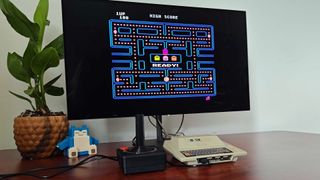
Since it’s 2024, I’d half expect my toaster to be able to run games from 40 years ago. Still, it’s important to place systems like the THE400 under the microscope, as for over $100, I’m expecting a flawless experience. And, as far as I can tell, the mini machine runs everything flawlessly, even going as far as to mimic bugs that also happen on my Atari 600XL.
For context, it’s an Atari 600XL I’m using as a comparison point, as I sadly don’t own the exact system the THE400 is based on. Both are effectively still the same machine, and the games I’m using for testing are physical carts I own that work on both versions. My benchmark selection includes a few personal favorites, like Caverns of Mars, Mountain King, and Turmoil, as I’m pretty familiar with how they should look and sound.



Again, I didn’t pick up on anything that sounded off or felt laggy, and each game looks pretty spectacular thanks to the THE400’s clean 720p signal. My 600XL has a composite out port, so it doesn’t look quite as bad as the Atari 400’s RF output. Nevertheless, we’re talking about a less than stellar analogue signal versus modern HD visuals, and I know what I’d pick any day.
I was also pleasantly surprised by the fact I could swap out the old school Atari joystick for a very slightly newer school 8bitdo Neo Geo pad, with buttons instantly self-mapping to system functions and specific game buttons. I haven’t tried too many different pads yet, but I’m willing to bet quite a few will work seamlessly with this console. Alternatively, you could pick up one of the new pads designed with the mini in mind.
Should you buy the THE400 Mini?
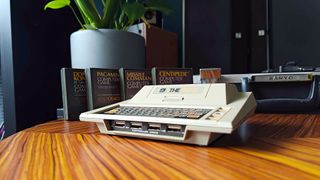
It’s safe to say that the THE400 is a must have mini for Atari fan, serving as an adorable homage to a historic system. Its price tag isn’t exactly casual friendly, and it caters more to players who are curious about the realm of 8-bit gaming. Simply put, your dad's first PC is back in a big (small) way, and that’s sure to delight those of you old enough to remember the platform and enthusiast collectors alike.
If we end up with a different version of the THE400, I’d love to see the precious 80s PC time capsule gain some more physically interactive elements, as it’d help paint a perfect picture of what it was like to use the microcomputer. I can think of a few tiny gamers in my family who think DVDs are a novelty, never mind a spaceship you jam cartridges into, so it’s the one improvement I can think of that’d elevate this mini to full score greatness.
How I tested the THE400 Mini
For a week, I swapped out my Nintendo Switch for the THE400, using my spare time to explore the mini console's built-in library of games as well as run my own collection via USB. During that time, I also set up my Atari 600XL microcomputer using an OSSC upscaler to compare its visuals against THE400's emulation, checking aspects like latency and audio for imperfections.
If you'd like to learn more about how we test mini consoles and other retro gaming gadgets, swing by our GamesRadar+ Hardware Policy to learn more.
Looking for something more portable? Check out the best gaming handheld options for system's that'll run your retro collection. Alternatively, take a peek at the best gaming monitors and best gaming TVs for screens that'll bring the classics to live.

I’ve been messing around with PCs, video game consoles, and tech since before I could speak. Don’t get me wrong, I kickstarted my relationship with technology by jamming a Hot Wheels double-decker bus into my parent’s VCR, but we all have to start somewhere. I even somehow managed to become a walking, talking buyer’s guide at my teenage supermarket job, which helped me accept my career fate. So, rather than try to realise my musician dreams, or see out my University degree, I started running my own retro pop culture site and writing about video games and tech for the likes of TechRadar, The Daily Star, and the BBC before eventually ending up with a job covering graphics card shenanigans at PCGamesN. Now, I’m your friendly neighbourhood Hardware Editor at GamesRadar, and it’s my job to make sure you can kick butt in all your favourite games using the best gaming hardware, whether you’re a sucker for handhelds like the Steam Deck and Nintendo Switch or a hardcore gaming PC enthusiast.
